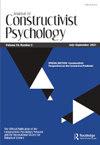Agency of English-Speaking Migrant Women during the Pandemic in Israel
IF 0.7
4区 心理学
Q3 PSYCHOLOGY, CLINICAL
引用次数: 1
Abstract
Abstract This study is embedded within a distinct pro-migration incentivized ‘Law of Return’ migration policy in Israel, as it considers the impact of the COVID-19 pandemic on migrant women, their agency, and proculturation. It features stories of migrant women during the COVID-19 pandemic, exploring their agency within the Individual-Socio-Ecological frame of reference of I-positions in the dialogical self theory. This qualitative study on English-speaking women in Israel (N = 39) is empirically grounded in lived experiences of meaning making, mothering, family dynamics, work, and access to healthcare under conditions of lockdown. The analysis of participants’ stories resulted in identifying six overarching themes relevant to migrant women: familial roles, mental labor, voicing resistance, mindfulness, intergenerational solidarity, and transnationalism. This study provides a construct clarification of agency, introducing three levels of agency: inward, social, and societal. In particular older migrant women may appeared to be losing agency during the COVID-19 pandemic in Israel, if the focus was solely on decision making and taking action. However, this study suggests that inward I-positions, in particular as related to mental labor, seemed to flourish during the COVID-19 pandemic, when many participants could engage in a more limited way on social and societal levels.以色列大流行病期间讲英语的移民妇女机构
摘要这项研究包含在以色列一项独特的反移民激励的“回归法”移民政策中,因为它考虑了新冠肺炎大流行对移民妇女、她们的机构和文化的影响。它以新冠肺炎大流行期间移民妇女的故事为特色,探索她们在对话自我理论中我的立场的个人-社会-生态参考框架内的作用。这项针对以色列英语女性的定性研究(N = 39)的经验基础是在封锁条件下创造意义、养育子女、家庭动态、工作和获得医疗保健的生活经历。通过对参与者故事的分析,确定了与移民妇女相关的六个总体主题:家庭角色、脑力劳动、发声抵抗、正念、代际团结和跨民族主义。本研究对代理进行了结构澄清,引入了三个层次的代理:内部代理、社会代理和社会代理。特别是在以色列新冠肺炎大流行期间,如果只关注决策和采取行动,老年移民妇女可能会失去代理权。然而,这项研究表明,在新冠肺炎大流行期间,内向的I-职位,尤其是与脑力劳动有关的职位,似乎蓬勃发展,当时许多参与者可以在社会和社会层面上以更有限的方式参与。
本文章由计算机程序翻译,如有差异,请以英文原文为准。
求助全文
约1分钟内获得全文
求助全文
来源期刊

Journal of Constructivist Psychology
PSYCHOLOGY, CLINICAL-
CiteScore
2.40
自引率
0.00%
发文量
22
期刊介绍:
Psychology and related disciplines throughout the human sciences and humanities have been revolutionized by a postmodern emphasis on the role of language, human systems, and personal knowledge in the construction of social realities. The Journal of Constructivist Psychology is the first publication to provide a professional forum for this emerging focus, embracing such diverse expressions of constructivism as personal construct theory, constructivist marriage and family therapy, structural-developmental and language-based approaches to psychology, and narrative psychology.
 求助内容:
求助内容: 应助结果提醒方式:
应助结果提醒方式:


